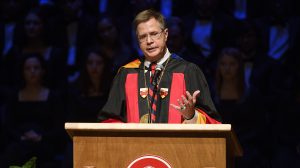
Jeffrey Vitter was officially named 17th chancellor of the University of Mississippi during his investiture ceremony Thursday (Nov. 10). Photo by Thomas Graning/Ole Miss Communications
OXFORD, Miss. – The University of Mississippi community celebrated a momentous occasion in the university’s life Thursday (Nov. 10) afternoon with the investiture of its 17th chancellor, Jeffrey S. Vitter.
In his inaugural address, Vitter called on the Ole Miss family to imagine what the future could look like if the full power of higher education was used to help people lift themselves above their circumstances and disadvantages.
He went on to recognize and praise the legacy of excellence that has grown at the university over recent decades through the efforts of visionary administrators, faculty, staff, students, alumni, government leaders and friends who have invested their time, talents and resources.
“We are standing atop a peak in our history, and, from where we now stand, we can see higher peaks,” Vitter said. “In becoming what we are, we have created greater capacity for what we can be.”
The new chancellor declared that the university must continue to seek greatness and announced that he will call on the UM community to develop ideas for high-impact multidisciplinary research initiatives called Flagship Constellations.
These clusters of faculty, staff, students, alumni and partners will tackle compelling challenges that require multidisciplinary collaborations. The Flagship Constellations will include joint degree programs across disciplines and campuses, engage in strategic growth of graduate programs, and develop key partnerships revolving around innovation and entrepreneurship.
“Just imagine what we can do if we identify universitywide priorities where we can be international leaders in addressing the important challenges in our state and world,” Vitter said. “Imagine what we can do if we take our collective strengths, leverage them, exploit multidisciplinary synergies and in the process come up with imaginative solutions to these grand challenges.
“No one discipline has all the answers, and only collaboration and deep insights from multiple points of view will discover solutions. Intersecting our disciplines will take many forms.
“As an example, imagine what we can do when we build upon the momentum from our recent CEO Technology Summit to establish an interdisciplinary program in data science and big data, which will inform and support discovery and decision making across the spectrum from health and medicine to science and engineering to the arts, humanities and social sciences.”
This is not the first time Vitter has encouraged input and collaboration from the Ole Miss community. In January, he conducted the Flagship Forum, a 100-day listening and learning tour from which emerged four themes for the university to create a roadmap into the future: academic excellence, athletics excellence, building healthy, vibrant communities and being key enablers of people, places and resources.
He also held a town hall meeting in August based on these four themes that resulted in more than 550 ideas for opportunities at the university.
Vitter also announced plans Thursday to develop a cultural gateway to the UM campus east of the Gertrude C. Ford Center for the Performing Arts. The goal is to bring together arts and cultural programs and create space for performance, experiential learning and enrichment opportunities.
He also plans to increase the university’s endowment from the existing $600 million to $1 billion. Those plans include an athletics endowment initiative, an endowment specifically to support the development, retention and engagement of talented staff, and growth of faculty excellence by creating new endowed professorships around the Flagship Constellations.
About 1,200 state officials, guests and members of the university community gathered for the ceremony at the Ford Center. Glenn Boyce, Mississippi commissioner of higher education, administered the oath of office.
“Dr. Vitter, I charge you to preside with fairness, humility and strength, striving always for excellence, knowledge and truth,” Boyce said. “I charge you to maintain and celebrate a climate that encourages the search for truth, a passion for justice and an expansion of the limits of knowledge. I charge you to serve the university with good stewardship, to protect and defend the university and to build the university to heights never before seen.”
In response to Boyce’s charge, Vitter responded in a uniquely Ole Miss fashion with the opening lines of the Hotty Toddy cheer: “Hell yeah, damn right.”
U.S. Sens. Thad Cochran and Roger Wicker highlighted previous accomplishments and welcomed Vitter to Ole Miss.
“Ole Miss continues to grow and prosper, producing leaders that have helped shape it into the world-class university it is today,” Cochran said. “I look forward to working with Chancellor Vitter to build on these successes. I look forward to seeing Ole Miss prosper and grow under his leadership.”
Wicker noted the historic nature of opportunities ahead.
“Chancellor Vitter has an impressive record upon which to build,” Wicker said. “His job is straightforward. Keep this historic university a place where Faulkner and Welty and Willie Morris can coexist with cutting-edge technology.
“Know this, Dr. Vitter: hundreds of thousands of alumni, students, faculty, staff and friends are counting on you and wishing you the best.”
Vitter said he was drawn to Ole Miss because of its rich tradition of academic excellence, strong sense of community and recognized history as an economic driver and thought leader.
He closed his address with a challenge to the university community.
“The next chapter in the life of this magnificent university sits squarely in all of our hands, waiting to be written – and read by future generations,” Vitter said. “All of us will ultimately be defined by what we leave behind.
“It is our destiny as a flagship university to desire more, to give more, to be more and to leave more behind. It is our calling to transform lives, communities and the world.”
For the full text, visit http://inauguration.olemiss.edu/.